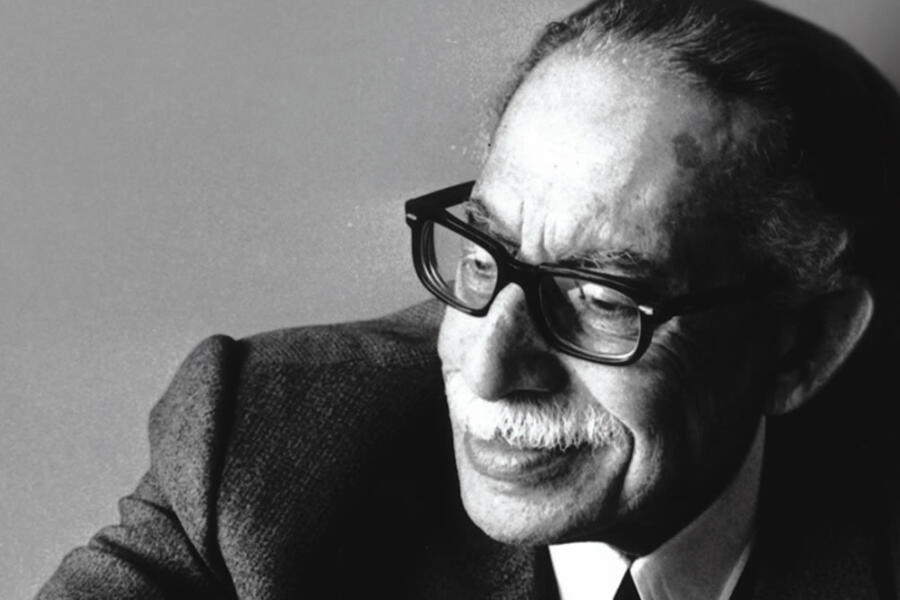In the realm of Arabic literature, few have reached the level of prominence and productivity that Tawfiq Al Hakim achieved, both in the quality and quantity of his works. Years later, his legacy survives as an author who challenged conventions and left an indelible mark on Arabic drama.
Greatly influenced by the events of his time —which witnessed a significant literary revival across various genres in Arabic literature— Al Hakim made substantial contributions to several forms of prose. Playing a key role in their development, the author wrote essays, letters, short stories, novels, and drama.
Born on 9 October 1903 in Alexandria to a well-to-do family with a father who worked in the judiciary, Al Hakim’s education was somewhat disrupted due to his father’s frequent relocations. However, he eventually settled in Cairo and decided to follow in his father’s footsteps, completing his bachelor’s degree in 1925.
When Al Hakim went to Paris for further education, the cultural scene of the city pushed him to discover his passion for theater. He indulged his passion for attending and reading plays, acting, and trying his hand at writing for the theater by immersing himself in European literature. This diverse exposure played a crucial role in shaping his literary maturity and creative talents. Upon returning to Egypt in 1930, he briefly worked as a prosecutor before resigning to fully commit himself to writing.
In his early career, he authored more than 400 plays, including works like Al Arees (The Groom, 1924) and Amam Shebak Al Tazaker (Before the Ticket Office, 1928). These plays were particularly artistic and rooted in Al Hakim’s personal views, serving as a platform for his critique of social life. This included criticisms of bureaucracy, social injustice, and corruption. His writings often even invited readers to explore themes of existentialism, angst, and freedom.
In addition to pioneering the dramatic genre in Arabic literature, Al Hakim authored novels, short stories, essays, and monographs. One of his notable novels, Awdet Al Roh (The Return of the Spirit, 1933), tells the story of Mohsen, an aspiring writer, drawing from Al-Hakim’s own experiences living in Cairo during and after the 1919 Revolution.
He began gaining international recognition following the publishing of another autobiographical novel, Matahet Al Adala (The Maze of Justice, 1937), which satirizes Egyptian bureaucracy. The book gained popularity with translations in English, Spanish, German, and Swedish.
Another novel, Asfor Min Al Sharq (A Sparrow from the East, 1938), was adapted into a film. It is a brief love story set in Paris between an Egyptian student and a ticket dispenser at a movie theater.
Al Hakim’s prolific career includes over 50 plays, primarily focusing on the social themes that troubled his mind — from religion and politics to women’s issues and human rights. Some of his notable works include Ahl Al Kahf, (The People of the Cave, 1933), inspired by the Quranic tale of the Seven Sleepers of Ephesus, Shahrazad (1934), based on “The Thousand and One Nights,” Oedip Malekan (King Oedipus, 1939), which was dubbed as the sole successful attempt into adapting Sophocles’ Oedipus Rex into an Arabic narrative. Rosasa Fi Al Qalb (A Bullet in the Heart, 1944) was one of Al Hakim’s most popular plays as it took a simple, comedic approach to deconstructing a major philosophical concept.
Al Hakim produced plays in this style primarily meant for reading rather than performance. He even refrained from calling them “plays” and published them separately in books.
This form of theater aimed to contribute to Egyptian society by addressing and highlighting societal values, exposing life’s realities, and portraying the authentic Egyptian way of life. Al Hakim excelled in understanding and conveying the essence of nature of things, which was a major theme in his work, in a unique style that skillfully combined symbolism, reality, and imagination. His distinctive style was characterized by his mastery of narration, dialogue, and choice of settings.
Al Hakim died on 26 July, 1987, leaving behind a literary approach that has inspired hundreds of both Egyptian and Arab writers. His legacy as the “Dean of Dramatic Literature” still lives on to this day.







Comments (0)